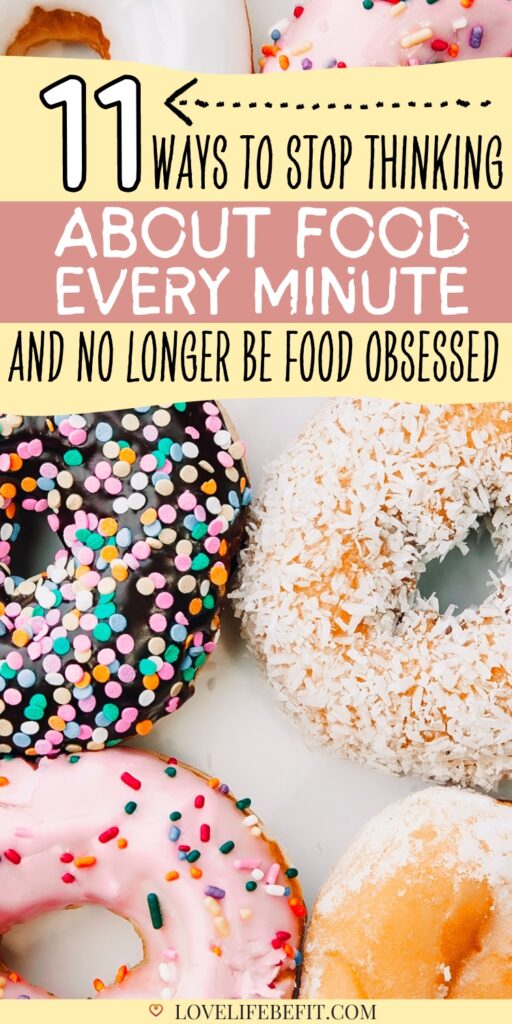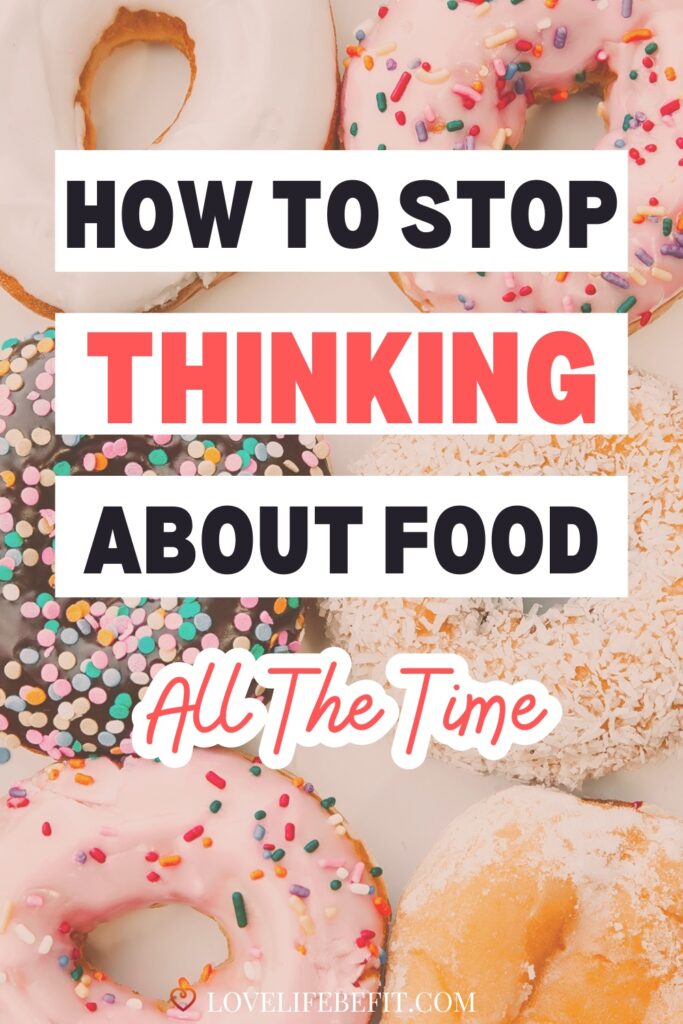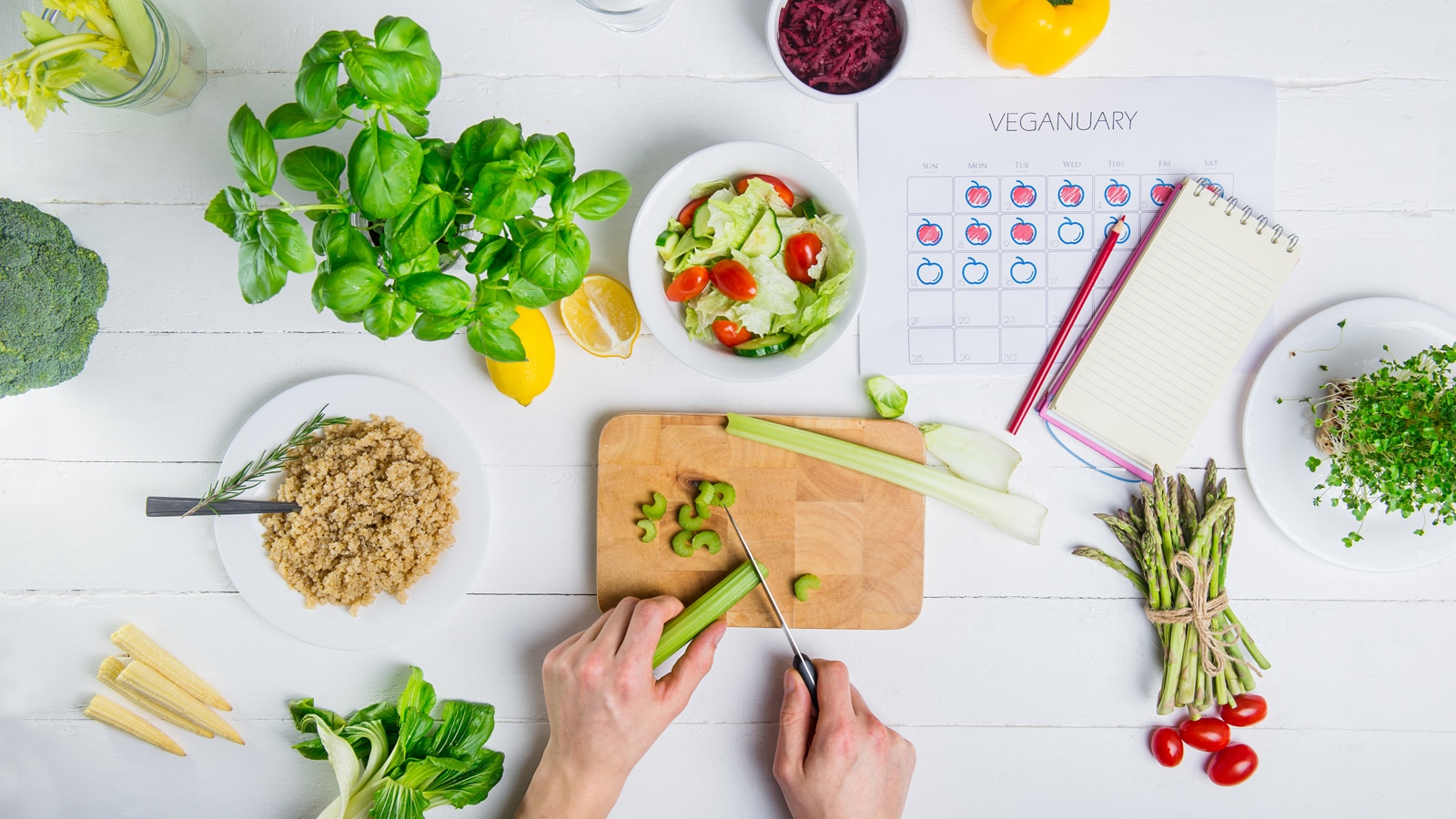How to Stop Thinking About Food (Overcoming Food Obsession)
We’re hard-wired to think about food. It’s a basic survival instinct. Back in our hunter-gatherer days, it was probably all we thought about – where was our next meal coming from?
Today, there are many people on this planet who still do not have enough to eat, but for the rest of us, food and thoughts about food have become a minefield. Overcoming food obsession, finding ways to stop thinking about food, and knowing what to do if you can’t stop thinking about food are the purposes of this post.
Eating feels so darn good and access to unlimited amounts of high-calorie sugary fatty food is slowly killing us. It’s a problem. A big problem and the diet industry feeds off it.
So, how do we stop food thoughts and improve our eating habits, choosing healthy foods? How can we break the habit of thinking about food constantly, craving food, and obsessing over what we’re going to eat next?
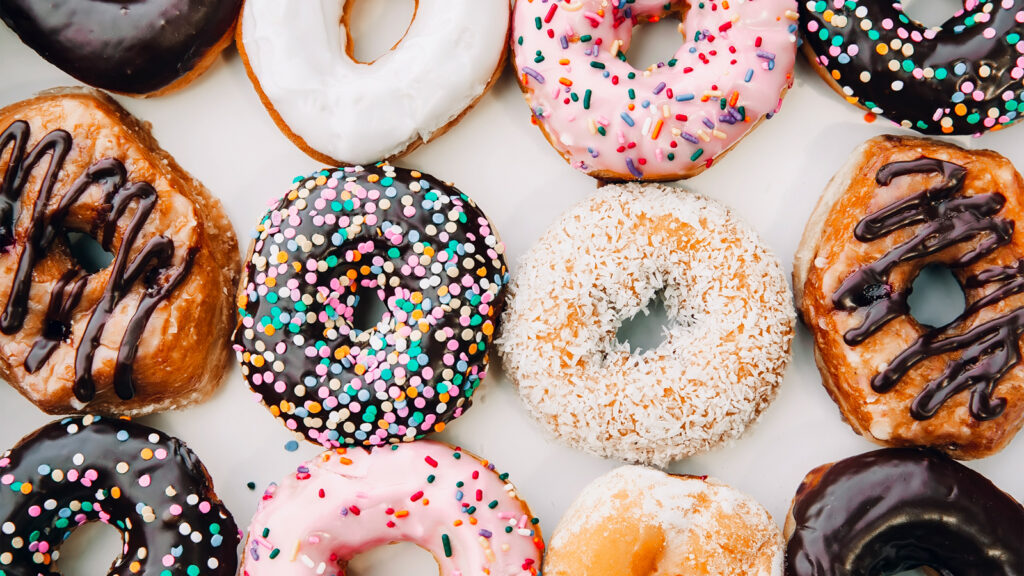
Why your brain is obsessed with food thoughts
Your brain uses two pathways to control hunger – the homeostatic pathway and the hedonic pathway.
The homeostatic pathway is all about maintaining equilibrium or balance in the body and making sure we eat enough calories. This is controlled by two “hunger hormones” – leptin and ghrelin. Leptin is produced by fat cells and signals to the brain when we’ve had enough food and should stop eating. Ghrelin is produced by the stomach and stimulates appetite. These hunger hormones should make sure you eat the right amount of food to help your body function correctly and maintain a healthy body weight.
The hedonic pathway, on the other hand, is all about pleasure. This is controlled by environmental triggers such as sight, smell, and taste of food. The more palatable (pleasing) a food looks or smells, the more likely we are to eat it. The hedonic pathway can override the homeostatic pathway, which is why it can be so hard to resist temptation.
What are hyper-palatable foods?
These foods are the ones that hit the pleasure centers of our brains especially hard. They are typically high in sugar, salt, and unhealthy fats. High-calorie foods like cakes, biscuits, chocolate, ice cream, pizza, crisps – you get the idea!
When we’ve had enough food to eat, our brain uses the leptin hormone to tell us to stop eating. But if we’re constantly exposed to hyperpalatable foods, the desire for these foods can overwhelm us – our brain fails to pick up on the signals saying we’re full. This is what leads to overeating and weight gain.
So, how do we break the habit of constantly obsessing over food? There’s no one-size-fits-all answer to this question, but read on for some tips that might help.
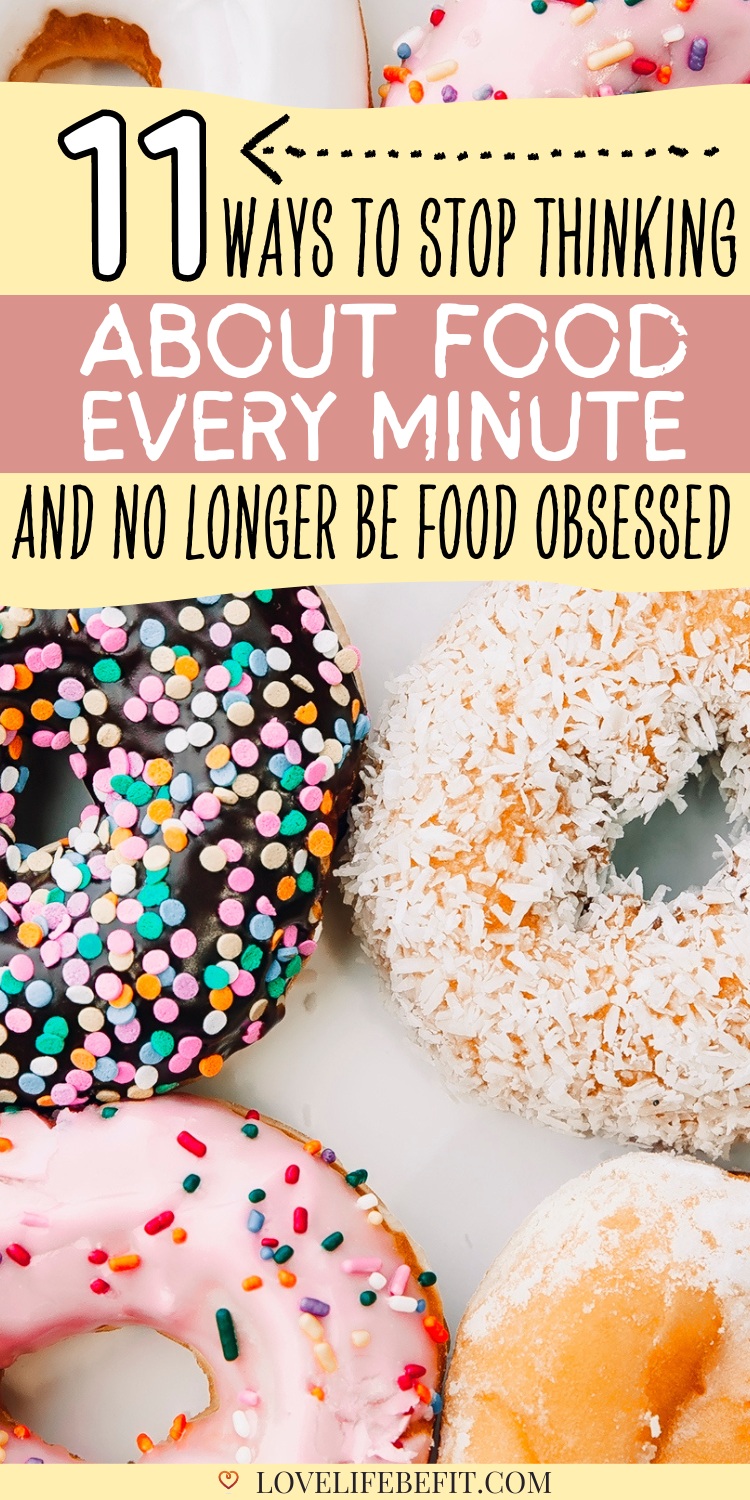
Ways To Manage Food Obsession
To manage your food obsession, you need to first understand what’s driving the behavior. Here are some possible reasons:
- You’re trying to avoid feeling negative emotions such as boredom, sadness, or stress.
- Feel you’re not good enough unless you’re thin and fit.
- You think that being on a diet is the only way to be healthy.
- You’re using food as a way to comfort yourself or reward yourself.
Once you’ve identified what’s driving your behavior, you can start to find ways to manage it and build a healthy relationship with food.
✳️Managing Food Obsession
- Try to identify your triggers and avoid them as much as possible.
- Make sure you have plenty of nutritious healthy snacks on hand.
- Keep a food journal
- Listen to your body
- Stay hydrated
- Try mindful eating
- Distract yourself with other activities when you feel tempted to eat.
- Challenge any negative thoughts about food and body image.
- Find an exercise routine that you enjoy and stick to it.
- Most importantly, be kind to yourself. Accept that you’re not perfect and it’s OK to indulge sometimes.
How To Stop Thinking About Food
Everyone has different reasons for obsessing about food, so what works for one person might not work for another. If there was an easy way to improve our eating habits there wouldn’t be a $72 billion diet industry in the US. We would all be healthy instead of overweight, suffering from food cravings and emotional eating. But hopefully, the tips in this article will give you a starting point for managing your food obsession.
#1 Avoid The Blame Game
It’s easy to feel guilty and ashamed when we’re struggling with food thoughts. But it’s important to remember that obsessing about food is a normal response to the current food environment – it’s not your fault!
Don’t attach any shame to the way you’re feeling and the thought of food. Accept that this is something you’re dealing with right now and there is nothing wrong with you. I know a LOT of women, (especially young women), who are a healthy, normal weight but still think they’re not thin enough. Take the woman in the picture. She looks healthy and she’s eating a bar of chocolate. There’s nothing to feel guilty about.
Food obsession is an addiction that affects millions of people. You’re not alone. Playing the blame game with feelings of guilt will just make it harder to lose weight. Instead, understanding what’s driving the behavior is the starting point for improving your relationship with food.

#2 Don’t Exclude Certain Foods
When we’re trying to diet, it’s easy to cut out all the “bad” foods and only eat what we deem as healthy. It’s popular in diet culture to impose food restrictions where your diet avoids specific foods. But this can actually backfire. If you deprive yourself of particular foods and follow strict food rules, you’re more likely to develop strong food cravings and eventually give in to temptation.
There’s a growing view that everyone should have a good fun food ratio when it comes to eating. By eating 80-90% healthy food and 10-20% fun food you can eat a wide variety of foods. You’re less likely to get bored and more likely to find something that satisfies your cravings. Food consumption still needs to be enjoyable.
So don’t exclude certain foods from your diet – give yourself full permission to indulge sometimes and enjoy your favorite foods. This is the best way to take the edge off your cravings and make it easier to stick to healthy eating in the long run.
#3 Avoiding Hyper-palatable Foods
Of course, a good fun food ratio goes against the advice of restrictive diets such as quitting sugar. Some nutritionists believe you should avoid all hyperpalatable foods – high fat, high salt, or high sugar foods that are easy to digest.
I think it comes down to understanding what works for your body. If sugar is your kryptonite, spiking your blood sugar levels, even a little, might provoke a cycle of binge eating making it difficult to keep to eating just a little of what you fancy. Not everyone can indulge without ending up in a negative spiral of overeating. It’s all about experimenting until you find what works for you.
#4 Eat Nutritious Healthy Snacks
When you’re not busy, it’s easy to get lost in thoughts about food. Boredom is a common trigger for food obsession. A way to manage this is to have healthy snacks of nutritious foods on hand that will keep you satisfied until your next meal.
Ideally, your snacks should be high in protein, fiber and whole grains as these will boost your energy levels and keep you feeling full for longer.
✳️Healthy snack ideas
- Homemade popcorn with olive oil and sea salt
- Vegetables with hummus or tzatziki
- Nuts and seeds
- Plant-based yogurt with berries
- Protein shake
- Apple with peanut butter
- Banana with almond butter
#5 Listen To Your Body
Sometimes we’re not hungry, but we still feel the urge to eat. This is often a sign that our body needs something else – usually vitamins or minerals.
When you’re not sure if you should be eating, ask yourself these questions:
- Am I really hungry? If you are EAT!
- What am I craving?
- Is this an emotional craving or true physical hunger?
If it’s an emotional craving, try and find another way to deal with the emotion. If it’s physical hunger, then try eating protein-packed snacks instead of turning to unhealthy food.
#6 Drink Plenty Of Water
When we’re dehydrated, our bodies can sometimes mistake the sensation of thirst for hunger. This is why it’s important to drink plenty of water throughout the day.
Water can help to suppress appetite and prevent us from overindulging in food. It also helps to flush out toxins from the body and keep us hydrated.
As a rough guide, most people need to drink at least eight glasses of water per day. If you find it hard to remember, try keeping a water bottle with you at all times.
#7 Keep A Food Journal
Keeping a food journal may seem like bad advice if you’re trying to stop thinking about food but it can actually be really helpful.
When you track everything you eat, you’re more likely to make healthy choices and stay within your calorie allowance. You’re also less likely to indulge in unhealthy foods as you’ll be able to see the effects they have on your body.
A food journal doesn’t have to be complicated – a simple list of what you ate and any potential food triggers you experienced is enough. This isn’t a calorie counting journal. The aim is to look for environmental triggers and emotional triggers. Discover why you’re self-sabotaging and making bad choices with food.
Record where you are, who you’re with, and how you’re feeling.
✳️Avoiding Obsessive Eating Triggers
A food journal can help you identify patterns of behavior that lead you to obsessively think about food. Some of the most common triggers are:
- boredom
- stress-related hunger pangs
- high emotions
- fear of failure
- difficult tasks or situations
- mixing with people who make you feel bad about yourself
- being around people who constantly make unhealthy food choices
- watching programs about food
- exposure to food commercials
Once you identify your food triggers you can start to take steps to avoid them. This may mean changing the way you spend your time, avoiding certain people or places, or distracting yourself with other activities when temptation strikes.
#8 Distract Yourself Until The Food Craving Passes
When you’re feeling the urge to eat, it can be helpful to distract yourself until the craving passes. This may mean doing something completely unrelated to food or taking a walk around the block.
✳️How to distract yourself from thinking about food
These are some ideas to help you get started:
- Stand up and move about
- Get some fresh air
- Take a walk or go for a run
- Do something that interests you and needs your full concentration
- Meditate or do a yoga workout
- Visit a friend
- Do some chores or housework
- Take a bath or shower
#9 Try Mindful Eating
So many of us have the bad habit of shoveling food as we read a book or watch TV. Instead, try mindfully eating – this is where you focus all your attention on the food in front of you.
Take small bites, chew slowly, and savor the flavor and texture. This will help you to eat less and enjoy your food more.
It may take a little practice but eventually, it will become second nature. And who knows, you might even start to enjoy your food more!
#10 Exercise More
Of course, I’m always going to encourage people to exercise more and be fit but studies show that exercise affects how we respond to food. It could be key to reducing your food intake.
Studies show that exercise may increase our appetites because we’re using more energy but it also enhances our post-meal satiety. Our brain is better at reading the signals that say when we’re full.
Plus when we’re physically active, our brains release endorphins which make us feel good. This helps to reduce stress levels and can stop us from feeling the need to reach for food as a form of comfort.
Regular exercise also helps to increase self-confidence and feelings of well-being. Both of these are key factors in helping to reduce food cravings.
#11 Stop Dieting
Just because we live in a diet culture where there’s constant pressure to think about our weight and food intake, it doesn’t mean that dieting is the answer. In fact, following the latest fad diet can actually lead to increased thoughts about food and weight gain in the long term.
Dieting disrupts our natural body weight set point and makes us more likely to obsess over food. It also increases our chances of developing eating disorders. Even clean eating and obsessing over healthy eating can have the same effect. There’s a big difference between trying to eat better and obsessing over the ingredients of everything you put in your mouth – cut yourself some slack.
Instead, find an exercise you enjoy, and take just small steps to improve your diet – it’s better to make a few healthy choices and build a good relationship with food rather than follow a restrictive diet. Stop thinking about food by focusing on living your life. Do activities that make you happy!
When To Seek Help
Don’t wait until you have a full-blown eating disorder or food obsession to seek help. Your constant thoughts about food could be an early warning sign that you’re heading down a dangerous path.
If you can’t seem to stop thinking about food, no matter what you do, it’s time to seek professional help. A therapist or counselor who specializes in eating disorders will be able to help you address the root cause of your problem and find healthy ways to manage your thoughts and emotions around food. Find out more from your doctor.
✳️Eating Disorders
If you’re concerned about your food obsession you can seek help right away from the National Eating Disorders Association (US) or the Beat Eating Disorders (UK). Both sites have free helplines and chatlines with fully trained advisors.

